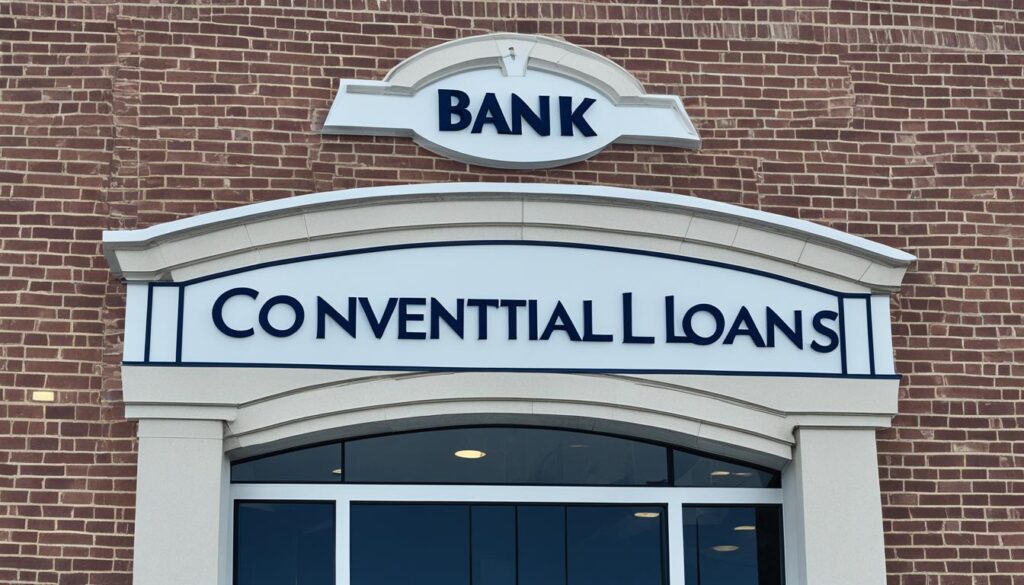Finding the best loan option for you requires thinking about your financial goals. It’s key to match the loan with what you need. There are many different types of loans, each with pros and cons. Choosing one that fits your financial goals is important.
Types of Home Loans
Many home loans are available to help you buy that dream home. Each type is designed for different situations. Knowing your options will help you choose what’s best for you.
Here’s a quick look at some common types:
1. Conventional Loans
Conventional loans are popular. They don’t come with government insurance and need a good credit score. You’ll also need at least a 5% down payment. Yet, they fit many property types and offer flexible terms.
2. FHA Loans
FHA loans are backed by the government to help those with low credit scores or buying their first home. What’s great is, you can put down as low as 3.5%, opening up more options for buyers.
3. VA Loans
For those who served their country, VA loans are a treat. You can buy with no down payment and no need for private mortgage insurance. Plus, they often have low interest rates, making it easier for military families to own a home.
4. USDA Loans
USDA loans are for those in rural areas with low to moderate income. They require no down payment and have loans with lower interest rates. But, you’ll need to pay for mortgage insurance.
5. Jumbo Loans
When you’re looking at pricey homes, jumbo loans are here to help. They cover homes that exceed usual loan limits. Although they need more for a down payment, you might find their rates and terms appealing for that luxury home.
6. Adjustable-Rate Mortgages (ARM)
ARMs start with a low fixed interest rate that can change after a set period. They’re good if you don’t plan to stay long in your home. Usually, they have lower initial rates than fixed mortgages.
7. 203k Rehab Loans
203k Rehab Loans can help you buy and fix a home in a single loan. They’re perfect if you’re dreaming of a home you can personalize. This way, you’ll have the house of your dreams.
Now you know your options in the world of home loans. A good look at your financial situation and goals will point you to the right loan. Don’t forget, talking to a mortgage expert can make this process a lot smoother.
| Loan Type | Key Features | Eligibility Requirements |
|---|---|---|
| Conventional Loans | Flexible terms, various property types | Credit score of 620+, down payment of at least 5-10% |
| FHA Loans | Low credit requirements, low down payment | Credit score of 500-579 (10% down payment) or 580+ (3.5% down payment) |
| VA Loans | Zero down payment, no private mortgage insurance | Eligible service members, veterans, surviving spouses |
| USDA Loans | Zero down payment, below-market interest rates | Low- and middle-income buyers in designated rural areas |
| Jumbo Loans | Financing for high-priced homes | Higher credit score, larger down payment |
| Adjustable-Rate Mortgages | Initial low interest rate, potential for rate adjustment | Credit score, income stability, future interest rate expectations |
| 203k Rehab Loans | Financing for home purchase and renovations | Meets FHA loan requirements, property in need of repairs or renovations |
How to Compare Loan Options
Choosing the right loan is key to your financial success. It’s important to look at many factors before deciding. This will ensure your choice meets your needs and goals. Let’s look at some things to keep in mind.
1. Monthly Payment
Start by comparing the monthly payment. Loans vary in interest rates and how long you have to pay them back. This affects your monthly costs. Knowing this will help see if you can afford the loan.
2. Upfront Costs
Don’t forget the upfront costs. These can include fees for applying, setting up the loan, checking the house, and closing the deal. Looking at these costs shows you what you need to pay right away.
3. Total Cost Over the Life of the Loan
Looking at the total cost over time is important. The interest rate impacts the final cost a lot. A lower rate means you could save money in the long run.
4. Credit History Requirements
Consider how strict loan options are about credit scores. Knowing your credit score will help find loans you could get. It’s important to check if you’re eligible for the loan.
5. Income Eligibility
Check if you need to earn a certain amount to get the loan. Look at any income or debt limits. This lets you know if you qualify for the loan.
6. Price Range for Home Buying
See if loan options match the price of homes you’re looking at. Some loans work better for certain prices. It’s key to match the loans with your home budget.
Think through these points when looking at loans. Finding the right loan means looking at what you need and can manage. The best loan choice is one that fits your financial picture and goals.
Always get advice from a mortgage expert. They can help find the best loan for you.
Conventional Loans
Conventional loans are very common for buying homes. They are seen as affordable for those with good credit and a 5-10% down payment. These loans have good rates and can work for different types of homes. Yet, you need a 620 credit score or more. And if your down payment is less than 20%, you might need private mortgage insurance.

If you want to buy your dream home, a conventional loan can make it happen. This is true whether it’s your first home or you want to move to a better one.
Key Features of Conventional Loans:
- They come with competitive rates for people with good credit.
- You can start with a down payment as low as 5-10%.
- There’s no need for an upfront mortgage insurance premium if you put down 20% or more.
- Mortgage insurance costs are usually lower than other loan types for those with less than a 20% down payment.
- You can get loans up to a certain limit according to Fannie Mae and Freddie Mac.
Conventional loans let you pick from many lenders and options that fit your budget. Your credit and down payment affect if you qualify and the rate you’ll get.
It’s good to know that conforming loans are a type of conventional loan. They follow rules from Fannie Mae and Freddie Mac, like loan size and who can get them.
For people with good credit and a steady job, conventional loans are a great choice. If you’re thinking about buying a home, checking out your conventional loan options is smart. You might find the perfect one for you after looking at different lenders.
FHA Loans
FHA loans are a favorite among first-time home buyers and those with lower credit scores. They are backed by the Federal Housing Administration (FHA). This makes them a good choice for people wanting to buy a home but facing credit hurdles.
These loans help those who can’t get traditional loans because of their credit past. The FHA gives a break with easier credit rules. This makes it possible for those with low credit to own a home.
FHA loans let you make a smaller down payment. Unlike conventional loans needing 5-10% down, you could pay just 3.5%. This is great news for buyers with little cash on hand.
Yet, FHA loans come with a need for mortgage insurance. It’s there to protect the lender if you can’t pay. There’s an initial MIP due at loan start. And, you also pay for it each year.
The initial MIP can be added to your loan balance or paid upfront. The yearly MIP is rolled into your monthly mortgage. How much you pay is tied to your home’s value, your loan’s length, and your down payment size.
If getting a home loan is tough because of your credit, look into FHA loans. They offer a route to owning a home with lower hurdles. Do remember, though, that you’ll pay extra for mortgage insurance, both at the start and yearly.
VA Loans
VA loans are great for those who served, including veterans and their spouses. They offer special benefits that make buying a home easier. If you qualify because of your service, look into VA loans.
Zero-Down Payment Option
Veterans can buy a home without a down payment thanks to VA loans. This means you don’t need a lot of money upfront. It’s a big plus for those saving for other needs or investments.
Lower Interest Rates
VA loans usually have lower interest rates than regular loans. Lower rates mean saving money over time. This can lower your monthly payments and make owning a home more affordable.
No Monthly Mortgage Insurance
With VA loans, there’s no need for monthly mortgage insurance. This saves a good amount of money. You can use this extra cash for other financial goals. Not having to pay this insurance each month also makes VA loans more appealing.
Upfront Funding Fee
VA loans have an upfront funding fee. It’s a one-time payment at the start. This fee supports the VA loan program for future service members. You can include this fee in your loan or pay it upfront.
VA loans provide great benefits like no down payment and lower rates. Even with a one-time fee, their perks make getting a home a good deal for veterans. Looking into VA loans is a smart move if you’ve served and want to buy a home.
USDA Loans
USDA loans are great for those wanting to buy homes in rural areas. They are for low- and middle-income people. The benefits include not needing a down payment and lower mortgage rates. But, it’s crucial to know about the fees and who can get the loan.
Benefits of USDA Loans
These loans help people with low incomes buy a home in the country:
- With no down payment, it’s easier to afford a home. This is perfect for those without a lot of savings.
- The rates are lower than usual, making payments more affordable. This saves you money in the long run.
However, USDA loans have their own rules and costs. Let’s look at those.
Eligibility Requirements
To get a USDA loan, here’s what you need:
- Your home must be in a rural area. Check the USDA website to see if it qualifies.
- You must fall within certain income levels. This makes sure the loans help who needs it the most.
Upfront MIP and Annual MIP
Borrowers of USDA loans pay for mortgage insurance. There’s an upfront fee and a yearly fee. The first is a one-time cost added to your loan. While the second is included in your monthly mortgage.
| MIP Type | MIP Percentage |
|---|---|
| Upfront MIP | 1% of the loan amount |
| Annual MIP | 0.35% of the loan balance (divided by 12 months) |
These fees protect the lender and keep the USDA loan program running smoothly.
Before picking a USDA loan, think about the pros and cons. Talk to a loan advisor. They can help you see if a USDA loan is right for you.

Jumbo Loans
Jumbo loans help buyers afford expensive homes that go beyond Fannie Mae and Freddie Mac’s limits. They are a key to buying luxury real estate. Buyers can get the money they need for these big homes.
Compared to regular loans, jumbo loans need a bigger down payment and a good credit score. This is because buying expensive homes is more risky for lenders. If you want these loans, be ready to put more money down.
Borrowers might find that jumbo loans have lower interest rates than regular loans. This is because lenders want to work with wealthy people who qualify for these big loans. They offer good deals to these qualified buyers.
Let’s take a closer look at the key elements of jumbo loans:
Loan Limits
Jumbo loans cover homes that are more expensive than what Fannie Mae and Freddie Mac insure. These limits change every year and depend on where the home is. In 2021, for example, most areas had a limit of $548,250. Yet, some places could go up to $822,375.
Down Payment
Jumbo loans need a significant down payment because they finance costly homes. Typically, buyers must put down 10% to 20% of the home’s cost. This big down payment lowers the lender’s risk and secures the loan better.
Credit Score
To get good interest rates on jumbo loans, you need a solid credit score. Most lenders look for a credit score of 700 or more. A high credit score shows you can handle debt well and boosts your chance of getting approved.
Here’s an overview of the key features of jumbo loans:
| Key Features of Jumbo Loans | Details |
|---|---|
| Loan Purpose | Purchasing high-priced homes exceeding loan limits |
| Loan Limits | Varies by location and adjusted annually |
| Down Payment | Usually between 10% and 20% of the property’s purchase price |
| Credit Score | Typically requires a good credit score of at least 700 |
| Interest Rates | Competitive or even lower than conventional loans |
For those wanting to buy luxury homes, jumbo loans offer a path. Although they require a larger down payment and a good credit score, they make owning prestigious properties achievable.
Adjustable-Rate Mortgages
When looking at loans, think about adjustable-rate mortgages (ARM). They start with a fixed interest rate for 3 to 10 years. Then, the rate changes based on market conditions.
ARMs often have lower initial rates than fixed-rate mortgages. This could mean smaller monthly payments in the beginning. It’s good if you’re not planning to keep the house long.
But, ARMs can change over time, and your payments could go up. If rates rise, so does your cost. Yet, if rates fall, you pay less.
Think about your future and if you’re comfortable with some risk. If you think rates may go down, ARMs might work for you. Or if you plan to move or refinance before the fixed period ends.
Benefits of Adjustable-Rate Mortgages:
- Lower initial interest rates
- Potential for lower monthly payments during the fixed-rate period
- Suitable for short-term affordability
- Opportunity to take advantage of falling interest rates
- Flexibility to sell or refinance the property before the rate adjustment period
Make sure to fully understand what you’re signing up for with an ARM. Talking to a mortgage expert can help. They can offer advice that fits your financial goals.
Keep reading to compare different loan options. This way, you can make a choice that’s best for your financial future.
Conclusion
Making the right loan decision is critical. You need to think about your financial goals and personal situation. Look at different loans and compare them to choose wisely.
Check things like monthly payments and costs. Also, think about the total loan cost over time. Your credit history and how much you earn are important too.
Choosing well means you’ll be on the right track for your goals. This applies whether you’re buying a house, starting a business, or dealing with sudden bills. With a good decision, success is more likely on your financial journey.
FAQ
What loan options are available to choose from?
You can pick from several types of loans. Some examples are conventional loans, FHA loans, VA loans, USDA loans, jumbo loans, and adjustable-rate mortgages.
How do I choose the best loan option for me?
Think about your financial goals, credit history, and how much you make. Also, consider what you can afford when buying a home. This will guide you to the right loan for you.
What are conventional loans?
They’re the usual home loans. They work well for buyers with good credit and who can put down 5-10%. With competitive rates and flexible terms, they can fit various property needs.
What are FHA loans?
These are for first-time buyers or those with low credit scores. They’re backed by the Federal Housing Administration. They require less down payment but need mortgage insurance.
What are VA loans?
If you’re serving, a veteran, or a spouse, you could qualify for these loans. You might not need to pay anything upfront. They have better interest rates, and no monthly mortgage insurance is needed.
What are USDA loans?
Low- and middle-income buyers in rural areas can apply for these. They have no down payment and lower interest rates. But you will pay some upfront and annual mortgage insurance.
What are jumbo loans?
Jumbo loans are for high-priced homes. They require a bigger down payment and good credit. But, their rates can be as good as or better than conventional loans.
What are adjustable-rate mortgages?
These mortgages start with a fixed rate that changes over time. They might have lower initial rates. They’re good if you plan to sell or refinance before the rate changes.


















